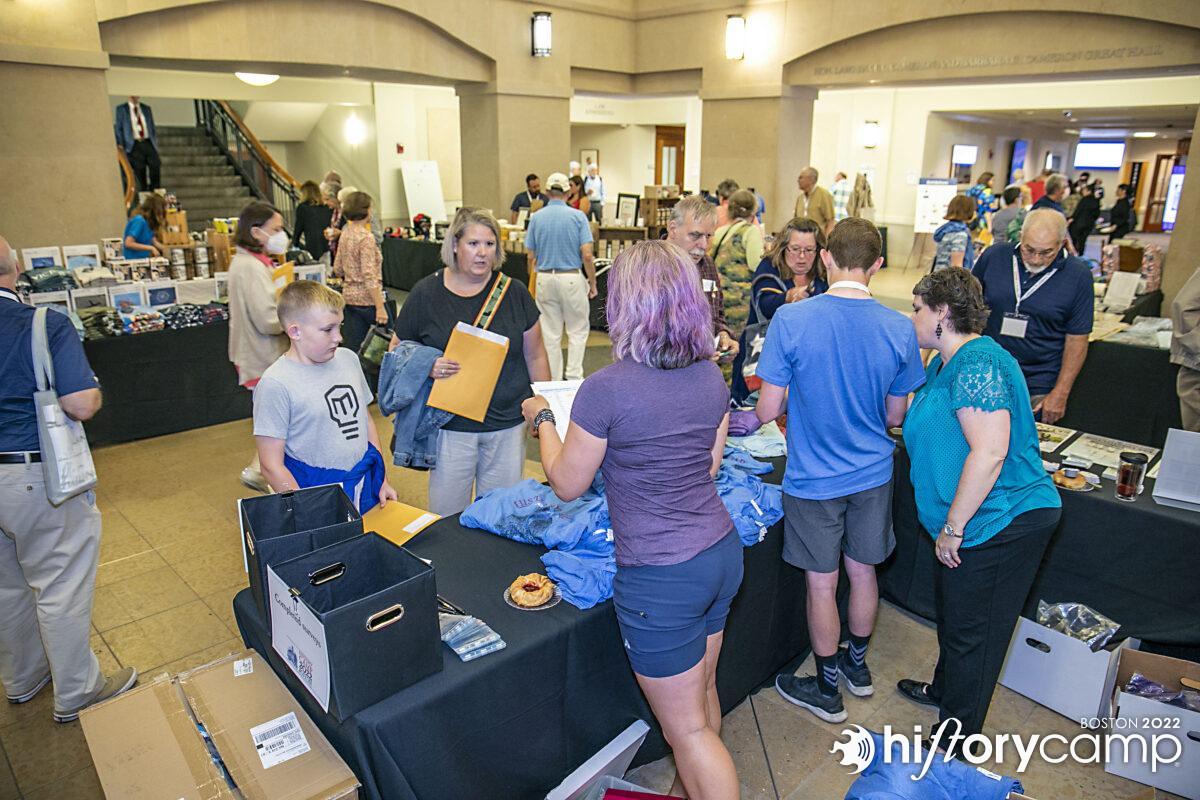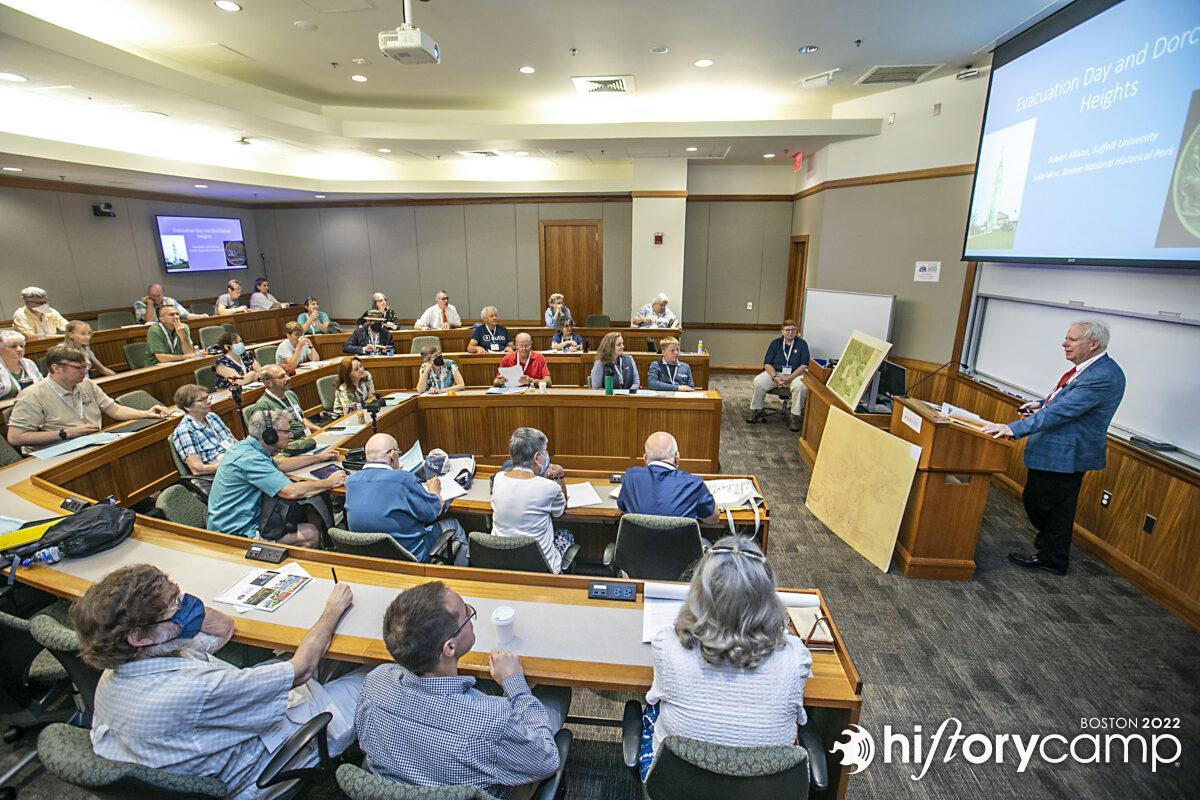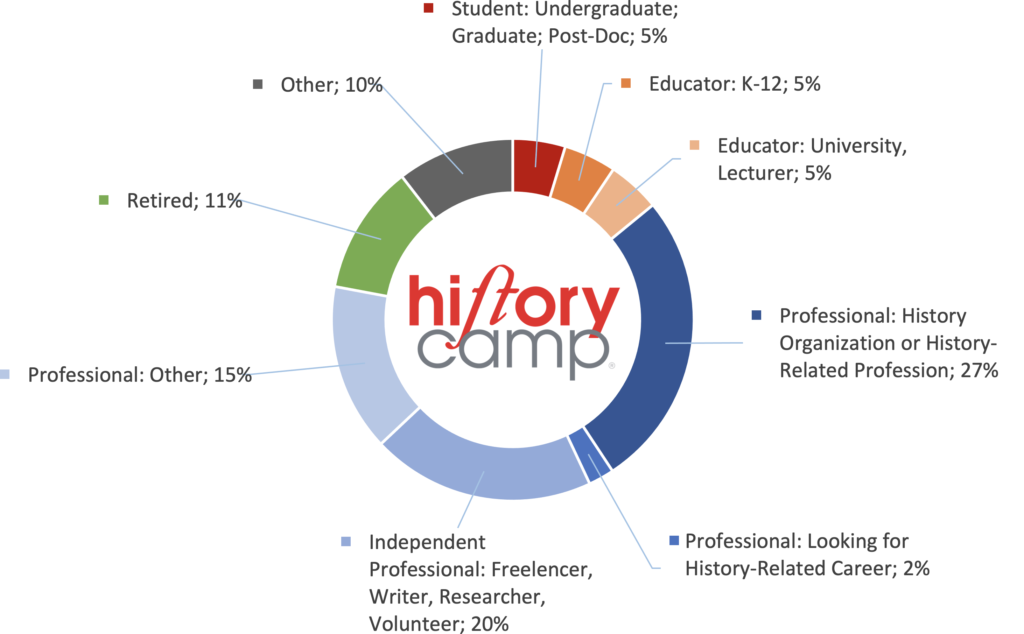What is History Camp?
Here’s how some of the people who attended History Camp Boston 2024 (photos and sessions and videos) described it
“A history lover’s get-a-way!”
“A must-see event because of the variety of learning sessions available”
“It’s like being a kid in a candy shop! So many good choices, so hard to choose!”
“I LOVED today. It’s so rare for those of us who don’t work in history to get the change to indulge in this passion with others who share our enthusiasm. It was amazing to spend the day with everyone and soak up everyone’s enthusiasm and energy!”
“A great one-day chance to hear incredibly knowledgeable people on a wide range of history topics.”
“Comicon for history nerds – fun!”
“It’s a history conference without gatekeeping”
A place where everyone else is as enthusiastic about history as I am
“History Nerdfest”
“An excellent day filled with informative sessions! Surrounded by folks who share a love of history—and where I don’t feel like the solo ‘History Nerd’!”
“This is something I look forward to every year because of all the discoveries I make, large and small. Also, delightful, if all too brief, conversations with fellow history geeks.”
“A voluminous buffet of history presentations geared for anyone—from someone with a casual interest to an expert.”
“Like going back to college—running back and forth between related and unrelated classes.”
“If you love history, this is the place to be!”
History Camp was founded in 2014 as a casual conference for adults from all walks of life—students, teachers, professors, authors, bloggers, reenactors, interpreters, museum and historical society directors and board members, genealogists, and everyone else—regardless of profession or degree—who is interested in and wants to learn more about all aspects and eras of history. History Camp takes place once a year, usually in mid-August in Boston.
There is no theme or format required, but there are two restrictions: No current (post-Nixon) politics and no sales pitches in sessions.
History Camp Discussions, added in 2020, are weekly streamed and archived discussions with noted history authors. We now have more than 200 interviews and presentations in our archive.
Pursuit of History Weekends, which we introduced in 2023, offer a small group of people the opportunity to take a deep dive into history where it happened, discovering not just what happened but why. These curated events bring together the foremost authors and historians and take place at historic sites across the country.
All of these initiatives and more are projects of the non-profit organization The Pursuit of History, which was founded in 2019 to expand History Camp and bring new programs to more people both in-person and online.

Sponsoring, exhibiting, volunteering, and more
History Camp is a project of the non-profit organization The Pursuit of History, a registered non-profit devoted to bringing people from all walks of life together around history.
Here’s how individuals and organizations can be part of and support History Camp:
- Presenting—Individuals and organizations are welcome to present provided that the presentations deliver real value to attendees, are not sales pitches, and do not involve modern (post-Nixon) politics. Learn more about presenting.
- Exhibiting—Organizations, including for-profit and not-for-profit organizations, can register for a table when they register for History Camp. Note that tables usually sell out early, so we recommend that you register as early as possible. The Partnership of the Historic Bostons, the New England Historical and Genealogical Society, the Daughters of the American Revolution, and History at Play are some of the organizations that have exhibited at History Camp.
- Selling merchandise—Individuals and organizations who wish to sell merchandise or put up their own booth or freestanding display should contact Lee Wright, President. Liberty & Co., TR Historical, The History List, and History Plunge are some of the organizations who have sold merchandise for history lovers at History Camp.
- Signing books—When they register for History Camp, authors who wish to sell and sign books can register for a table. Because tables usually sell out early, we recommend that you register as early as possible.
- Sponsoring—Individuals and organizations who sponsor History Camp are recognized in the program, online, and on signage at the event. They may wish to also present and exhibit. Contact Lee Wright, President, for details. Prior sponsors include the app maker Autio, Lorna Hainesworth, and Americana Corner.
- Volunteering—People who are registered for History Camp can also volunteer to help out with set up and registration in the morning, by serving as a room monitor during the day, or by helping pack up at the end of the day. Contact Lee Wright, President for details.
However you choose to participate, thank you. You make History Camp possible and keep it affordable for all.
“[The Expo Hall] is an amazing space to explore—and it is great to be able to see and feel the products. I started by buying for others but ended up buying more for myself!”
“As a researcher who uses my family research to inspire my historical research, I was so happy to see so many familiar faces there from my favorite libraries and archives!”
“The presentation on creating the traveling exhibits for the 400th anniversary of the Plymouth was one of the best presentations I’ve ever seen—a perfect mix of well-supported history, engaging design, reflection, and inclusivity.”
“Visiting John and Abigail Adams’ Peacefield and the crypt and graveyard where the family is buried are placed I have wanted to visit since I was in college. I am so glad History Camp arranged an outing and tour or it would still be on my to-do list.”

A Closer Look at History Camp
What do you mean by “a casual conference” or “un-conference”?
If you are deeply passionate about History Camp, we hope you’ll attend. If you are deeply knowledgeable about a topic and wish to present, we hope you’ll join us. You don’t have to submit a paper months in advance. There is no specific theme. The topics presented are the ones of interest to the presenters. The sessions that are well-attended are the ones that are of interest to the attendees. It’s an incredibly democratic way to gather and share information. To get an idea of the high-caliber of speakers and the fascinating breadth of topics, browse some of the past History Camps, such as History Camp Boston 2023.
History, not politics
History Camp is one of the few places where people can come listen to history without being inundated with current politics.
We draw the line at the Nixon administration, so anything from that administration and earlier is “in-bounds.”
Are teenagers and children welcome at History Camp America?
Yes. While most of the content, in terms of learning level, will be geared towards adults there will be tours of historic sites that will be enjoyed by all. Youth who are deeply interested in history will also find content that is enjoyable for them in the sessions.
General rules of the road
History Camp is a place where people who love history can gather, share ideas, learn new things, explore new facets of history, and have fun.
We prohibit any form of discrimination or harassment and hold all of participants to behave in a civil and professional manner. We reserve the right to control exhibits, presentation topics, sponsors, and/or attendees so that we ensure a supportive learning environment for all.
Learn more about History Camp:
“I’ve been to dozens of official academic conferences with big names where all submissions are thoroughly vetted by panels of experts and none of those conferences were as fun and informative as History Camp. It really was the best set of speakers I’ve seen at a conference: relaxed and informed and direct.”
History Camp Attendee Feedback Over the Years
- “There was such a variety of people and backgrounds that it made things very interesting.”
- “I did not realize when I signed up that there would be that many sessions to choose from all day. Solid presenters, great venue, good support.”
- “I was worried that as a layperson that I would feel incredibly out of place. Indeed, when the morning introductions were done, I was worried that I had made a huge mistake. But as the day went on, I didn’t feel that any of the talks I chose were beyond my understanding or interest. It was a really fun time.”
- “The topics were great and varied enough that I wouldn’t have gotten the breadth of knowledge at any other single event.”
- “It was a lot more fun than I expected! The group was a lot more diverse (in terms of professional backgrounds, stages in their career, etc.) than I expected.”
- “I was impressed with the number of talks that were offered and the professionalism of the speakers. Also, the event was extremely well organized, the space was perfect, and the lunch was very nice.”
- “It was exciting to, each hour, be able to, on a whim, pick a fascinating topic to explore in depth. It was very social too.”
- “It was fun to meet people from such a wide variety of background and interest.”
- “The people were great and genuinely interested in what everyone was doing and what they had to say.”
- “I was interested and impressed with the topics of discussion.”
- “There were so many different subjects and genres of history, all of them interesting, that it was difficult to choose which lectures to attend. I wish I could have been in 2 or 3 places at once.”
“There was such a variety of people and backgrounds that it made things very interesting.”
“I did not realize when I signed up that there would be that many sessions to choose from all day. Solid presenters, great venue, good support.”
“I was worried that as a layperson that I would feel incredibly out of place. Indeed, when the morning introductions were done, I was worried that I had made a huge mistake. But as the day went on, I didn’t feel that any of the talks I chose were beyond my understanding or interest. It was a really fun time.”
The topics were great and varied enough that I wouldn’t have gotten the breadth of knowledge at any other single event.”
“It was a lot more fun than I expected! The group was a lot more diverse (in terms of professional backgrounds, stages in their career, etc.) than I expected.”
“I was impressed with the number of talks that were offered and the professionalism of the speakers. Also, the event was extremely well organized, the space was perfect, and the lunch was very nice.”
“It was exciting to, each hour, be able to, on a whim, pick a fascinating topic to explore in depth. It was very social too.”
“It was fun to meet people from such a wide variety of background and interest.”
“The people were great and genuinely interested in what everyone was doing and what they had to say.”
“I was interested and impressed with the topics of discussion.”
“There were so many different subjects and genres of history, all of them interesting, that it was difficult to choose which lectures to attend. I wish I could have been in two or three places at once.”

